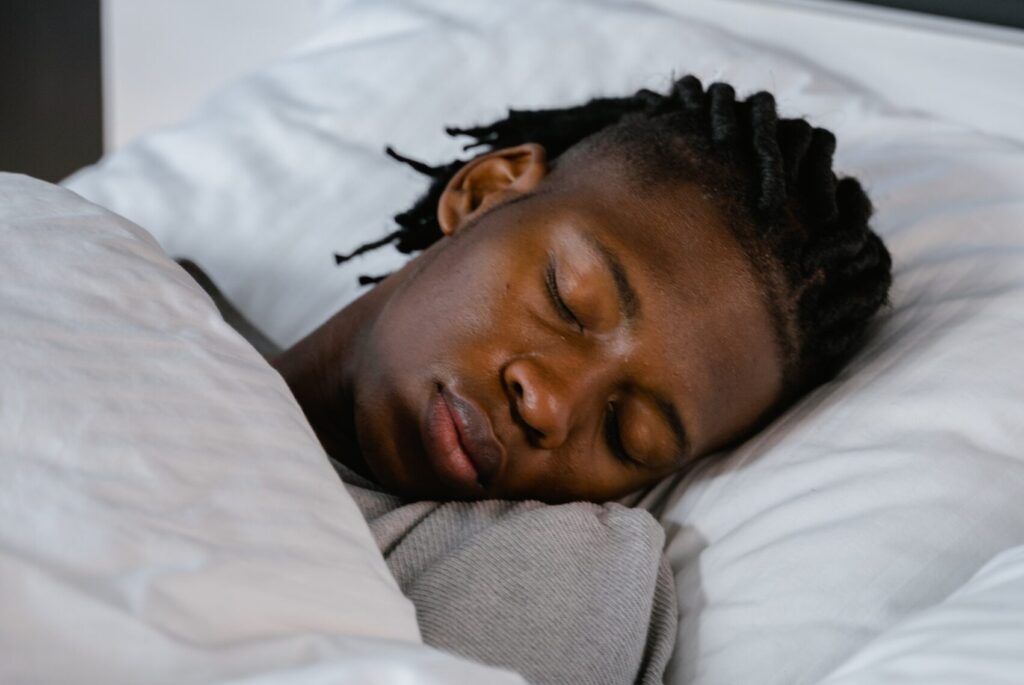Ok, everyone knows that we lose weight when we sleep. Why else would we weigh ourselves in the morning? At least that is what my mother always says. It turns out she’s right!
Studies strongly show that those who are sleep deprived tend to be overweight. Lack of sleep has been shown to increase appetite. Not only are you awake more hours to eat, but now you want to eat more during that time. In addition, the hormones from the lack of sleep cause you to crave high-calorie foods high in carbohydrates and fats. So your sleep problem is a double whammy.
Lack of quality sleep also makes it more difficult to have the energy to exercise. Thus, perpetuating the cycle. This all adds up to increased weight.
The 7-hour mark for sleep is the time that studies show an effect on most people. 89% of children and 55% of adults who get less than 7-8 hours of sleep have an increased risk for obesity.
Research has shown we need 7-9 hours of sleep a night. Everyone is different, there isn’t a one-size-fits-all here. So, you will have to see what works best for you and your health.
Routines are the key to a good night’s sleep. Habits are hard to change but sticking to them and seeing results will help you live a healthier you.
Our lifestyles, such as shift work, can make keeping a routine more difficult.
What can help with my sleep?
Try following these steps for a better night’s rest:
- Find a time of at least 9 hours to set aside to sleep. You may not be sleeping the whole time, it will be a process of getting to sleep and then awake.
- Try to set the same time period for sleep every day.
- Always sleep in a dark room. Any light, even from your phone charger, can disrupt your sleep rhythm.
- Always have no noise or “white” noise only, such as a fan. Shut off the TV due to light and auditory stimulation.
- Take a warm bath or shower prior to bed.
- Keep your linens and sheets clean. Try a weighted blanket.
- Start a daily exercise routine. Daily exercise has been shown to increase sleep quality.
- Do not drink any caffeine or alcoholic beverages prior to your bedtime.
- Increase water intake during the day.
- Decrease sugars and carbohydrates in your diet.
- Try a stretching or yoga routine in the evenings to wind down. Yoga has been shown to slow down the metabolic rate and put our minds at rest.
There are over-the-counter sleep aids. Sometimes these can help to get you into the rhythm of sleeping consistently but I would speak with your doctor before starting them. There are also prescription medications to help with insomnia. Most of these aides are only meant for short-term usage. The medication may not help with your quality of sleep. In the long run, you need both good quantity and quality sleep.
What are the causes of poor sleep?
In addition to your lifestyle, there are medical reasons for sleep disorders. If you have these they can lead to serious complications and they need to be addressed. Obstructive sleep apnea, gastroesophageal reflux disease, hormonal disorders, incontinence, prostate disorders, depression, and anxiety are just a few to start. Sometimes it is a mix of your sleep hygiene/lifestyle and a medical disorder. Sometimes the lack of sleep leads to obesity which in turn leads to the medical disorder creating a vicious circle.
Speak to your doctor if you have any of the following symptoms or any concerns:
- You are awaking tired after a full night’s rest.
- You are waking up snoring or with difficulty breathing at night.
- You can only sleep sitting up, such as in a recliner.
- You have nausea, reflux, or burning in your throat.
- You have a new or sudden sleeping issue.
- You are awakening throughout the night to go to the bathroom.
- You have developed night sweats.
Bottom Line
In short, lack of sleep affects your weight and can have serious consequences on your body. Always look for a reason for your sleeping issue. Is this a new problem, or long term? Is this sleep hygiene or is there a medical cause? Work on your sleep hygiene in consult with your doctor.
So sweet dreams into a healthier and maybe shrinking self!
What is sleep hygiene? updated 8-2022, Sleep Foundation website, accessed 8-2022
